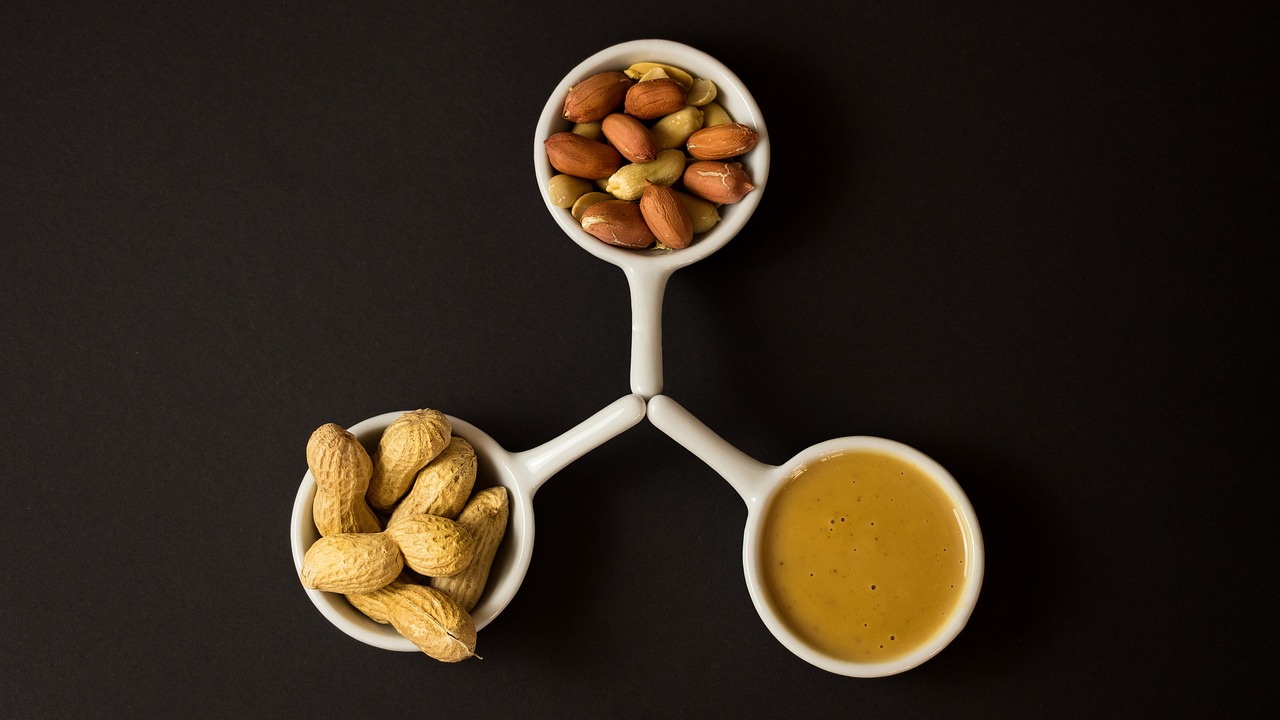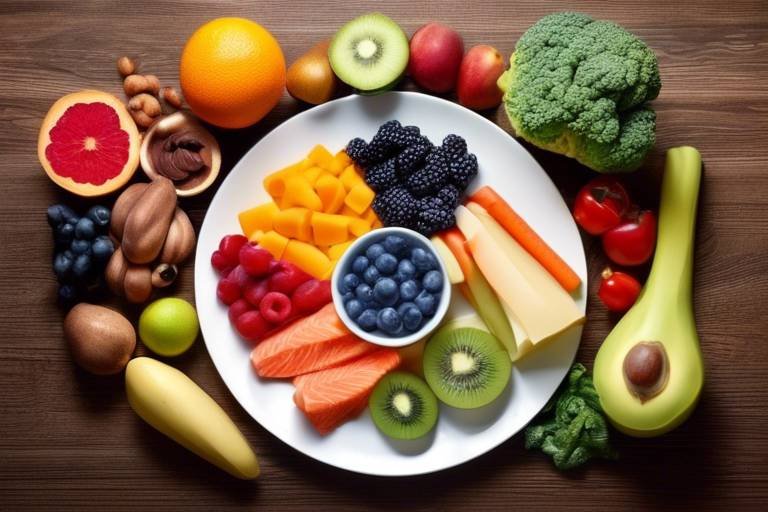Understanding the Connection Between Nutrition and Health
Have you ever wondered why some people seem to bounce back from illnesses while others struggle? The secret often lies in nutrition. What we eat plays a pivotal role in our overall health, influencing everything from our energy levels to our immune response. A well-balanced diet is not just about keeping hunger at bay; it’s about fueling our bodies with the right nutrients to thrive. Think of your body as a high-performance car; it needs premium fuel to run smoothly. Without the right nutrition, you risk running into a series of health issues that could have easily been prevented.
Nutrition impacts various aspects of our lives. It can enhance our mood, improve our cognitive functions, and even affect our skin health. When you nourish your body with whole foods—like fruits, vegetables, whole grains, and lean proteins—you’re not just filling your stomach; you’re also providing your body with the necessary tools to fight off diseases and maintain optimal health. Conversely, a diet high in processed foods and sugars can lead to chronic conditions such as obesity, diabetes, and heart disease.
But what does it really mean to have a balanced diet? It’s not just about eating less or cutting out certain foods; it’s about incorporating a variety of nutrients that work together to support your body. This includes understanding the roles of carbohydrates, proteins, and fats, as well as the essential vitamins and minerals that our bodies need in smaller amounts. Each nutrient plays a unique role, and together they create a symphony of health benefits.
To illustrate the importance of these nutrients, consider this table that outlines their roles:
| Nutrient | Role in the Body |
|---|---|
| Carbohydrates | Primary energy source, essential for brain function |
| Proteins | Building blocks for tissues, enzymes, and hormones |
| Fats | Energy storage, supports cell growth, absorbs vitamins |
| Vitamins | Support immune function, energy production, and bone health |
| Minerals | Essential for nerve function, muscle contraction, and hydration |
In the end, understanding the connection between nutrition and health empowers us to make informed choices. It’s about creating a lifestyle that prioritizes wholesome foods and recognizes the profound impact of what we consume. By taking small steps towards better nutrition, we can enhance our well-being and pave the way for a healthier future.
- What are the signs of poor nutrition? Common signs include fatigue, frequent illness, and poor skin health.
- How can I start eating healthier? Begin by incorporating more fruits and vegetables into your meals and reducing processed foods.
- Is it necessary to take supplements? While a balanced diet usually provides all necessary nutrients, some individuals may benefit from supplements, especially if they have specific deficiencies.

The Importance of Balanced Nutrition
This article explores how nutrition impacts overall health, emphasizing the importance of a balanced diet, the role of nutrients, and practical strategies for improving dietary habits for better well-being.
Balanced nutrition is crucial for maintaining optimal health. It provides the necessary nutrients that support bodily functions, boost immunity, and reduce the risk of chronic diseases. Think of your body as a high-performance vehicle; just like a car needs the right fuel to run smoothly, your body requires a balanced diet to function at its best. Without the right mix of nutrients, you might find yourself running on empty, leading to fatigue and a host of health issues.
Incorporating a variety of foods into your diet ensures that you're getting a spectrum of vitamins and minerals. For instance, fruits and vegetables are packed with essential nutrients and antioxidants that help fight inflammation and promote overall wellness. Whole grains, lean proteins, and healthy fats should also be included in your daily meals to create a well-rounded diet. Each food group contributes unique benefits:
| Food Group | Benefits |
|---|---|
| Fruits and Vegetables | Rich in vitamins, minerals, and fiber; help reduce the risk of chronic diseases. |
| Whole Grains | Provide energy, fiber, and essential nutrients; support digestive health. |
| Lean Proteins | Essential for tissue repair and growth; supports immune function. |
| Healthy Fats | Support cell growth and nutrient absorption; promote heart health. |
Moreover, a balanced diet can also enhance your mood and mental well-being. Studies have shown that certain nutrients, like omega-3 fatty acids found in fish and nuts, can improve brain function and reduce symptoms of depression. So, if you’ve ever felt a little down, consider reaching for a handful of walnuts or a slice of salmon instead of that sugary snack.
It's also essential to recognize that balanced nutrition doesn't mean deprivation. It's about making informed choices and enjoying a variety of foods in moderation. This approach not only prevents binge eating but also fosters a healthier relationship with food. Imagine treating your body like a garden; nurturing it with diverse plants (foods) allows it to flourish. On the other hand, neglecting your garden can lead to weeds (health problems) taking over.
In summary, balanced nutrition is not just a trend; it's a lifestyle choice that can significantly impact your health. By embracing a diet rich in diverse nutrients, you're not only fueling your body but also paving the way for a healthier, happier life. Remember, every meal is an opportunity to nourish yourself, so choose wisely!
- What is balanced nutrition? Balanced nutrition refers to a diet that includes a variety of foods in the right proportions to provide the necessary nutrients for optimal health.
- Why is it important to eat a variety of foods? Different foods provide different nutrients; eating a variety ensures you get all the essential vitamins and minerals your body needs.
- Can I still enjoy my favorite foods while maintaining a balanced diet? Absolutely! Moderation is key. You can enjoy your favorite treats occasionally while focusing on a nutrient-rich diet overall.

Key Nutrients and Their Roles
When it comes to nutrition, understanding the various nutrients our bodies need is like unlocking a treasure chest of health benefits. Each nutrient plays a unique role in maintaining our well-being, just like different instruments in an orchestra come together to create a beautiful symphony. Let’s dive into the key players in this nutritional ensemble: carbohydrates, proteins, fats, vitamins, and minerals.
Carbohydrates are often seen as the villain in many diets, but they are actually the body's primary source of energy. Think of them as the fuel that powers your car; without it, you simply won't go anywhere. Carbs are essential for daily activities and are particularly important for brain function, which relies heavily on glucose derived from carbohydrates. Without adequate carb intake, you might find yourself feeling sluggish or unable to concentrate.
Now, not all carbohydrates are created equal. They can be categorized into two main types: simple and complex carbohydrates. Simple carbohydrates, found in foods like candy and soda, provide a quick burst of energy but can lead to spikes in blood sugar levels, often followed by a crash that leaves you feeling tired and irritable. On the other hand, complex carbohydrates, such as whole grains, legumes, and vegetables, offer sustained energy and are rich in fiber, which is vital for digestive health. Fiber acts like a broom, sweeping through your intestines and keeping everything running smoothly.
Next up are proteins, which are often referred to as the building blocks of life. Imagine your body as a construction site; proteins are the bricks and mortar that help build and repair tissues. They are crucial for growth, maintenance, and the production of enzymes and hormones. Ensuring you have enough protein in your diet is essential, especially if you're active or looking to build muscle. Sources of protein include meat, fish, dairy, legumes, and nuts. A balanced intake can help you feel fuller longer and support your overall health.
Fats often get a bad rap, but they are another essential nutrient that your body needs. Think of fats as the protective layer around your organs and a source of energy that the body taps into when carbs are low. They also help with the absorption of fat-soluble vitamins like A, D, E, and K. However, it’s crucial to differentiate between healthy fats and unhealthy fats. Healthy fats, found in foods like avocados, nuts, and olive oil, can support heart health and improve cholesterol levels. In contrast, unhealthy trans fats found in processed foods can lead to various health issues.
Lastly, we can't overlook the importance of vitamins and minerals. These micronutrients, although needed in smaller amounts, are critical for numerous bodily functions. Vitamins such as Vitamin C and Vitamin D help boost immunity and support bone health, respectively. Minerals like calcium and iron play vital roles in bone structure and oxygen transport in the blood. A deficiency in these micronutrients can lead to serious health issues, making it essential to include a variety of fruits, vegetables, and whole foods in your diet.
In summary, understanding the roles of these key nutrients can empower you to make informed dietary choices that enhance your health. Each nutrient contributes to a balanced diet, and by ensuring you’re getting enough of each, you can support your body’s needs and promote long-term well-being.
Q1: How can I ensure I'm getting enough nutrients in my diet?
A1: A well-balanced diet that includes a variety of foods from all food groups—fruits, vegetables, whole grains, proteins, and healthy fats—can help you meet your nutritional needs. Consider meal planning and prepping to ensure you have nutritious options readily available.
Q2: Are supplements necessary if I eat a balanced diet?
A2: Generally, if you're consuming a balanced diet rich in whole foods, supplements may not be necessary. However, some individuals may require supplements due to specific health conditions or dietary restrictions. It's best to consult with a healthcare professional.
Q3: How can I differentiate between healthy and unhealthy fats?
A3: Healthy fats are typically unsaturated fats found in foods like avocados, nuts, and olive oil, while unhealthy fats are often trans fats found in processed foods. Reading nutrition labels can help you make healthier choices.
Carbohydrates: Energy Sources
When it comes to fueling our bodies, carbohydrates are like the gasoline that keeps the engine running. They are the body's primary source of energy, playing a crucial role in everything we do—from running a marathon to simply thinking about what to have for dinner. Imagine trying to drive a car without fuel; that's what it's like for our bodies without adequate carbohydrates. They are essential for daily activities and are especially vital for brain function, as our brains rely heavily on glucose, a simple sugar derived from carbohydrates, to operate effectively.
However, not all carbohydrates are created equal. They can be broadly categorized into two types: simple carbohydrates and complex carbohydrates. Simple carbohydrates, found in foods like candy and soda, provide a quick spike of energy. While they can be tempting for a quick boost, they often lead to energy crashes that leave you feeling drained. On the other hand, complex carbohydrates, such as whole grains, legumes, and vegetables, offer a more sustained energy release due to their higher fiber content. This fiber not only helps keep energy levels stable but also promotes healthy digestion.
To better understand the impact of carbohydrates on our health, we can look at the glycemic index (GI). This index measures how quickly foods raise blood sugar levels. Foods with a high GI can cause rapid spikes in blood sugar, leading to increased hunger and potential overeating. In contrast, foods with a low GI provide a more gradual release of energy, which can be beneficial for weight management and overall health. Here’s a quick comparison of some common carbohydrate sources:
| Food Item | Type | Glycemic Index |
|---|---|---|
| White Bread | Simple | 70 |
| Brown Rice | Complex | 50 |
| Oatmeal | Complex | 55 |
| Table Sugar | Simple | 65 |
Incorporating a variety of carbohydrates into your diet can help ensure you’re getting the energy you need without the pitfalls of unhealthy choices. It’s all about balance. Think of your plate as a palette: a splash of whole grains here, a burst of colorful fruits and vegetables there, and you’ve got a masterpiece that not only fuels your body but also delights your senses.
So next time you reach for a snack, consider the type of carbohydrates you’re choosing. Opt for whole, unprocessed foods that will provide lasting energy and support your overall health. After all, a well-fueled body is a happy body!
- What are the best sources of carbohydrates? Whole grains, fruits, vegetables, and legumes are excellent sources of healthy carbohydrates.
- Should I avoid carbohydrates to lose weight? No, carbohydrates are essential for energy. Focus on choosing healthy, complex carbohydrates instead.
- How can I tell if I'm consuming too many simple carbohydrates? If you frequently experience energy crashes or cravings, you may be consuming too many simple carbs.
Simple vs. Complex Carbohydrates
When it comes to carbohydrates, understanding the difference between simple and complex carbohydrates is crucial for making informed dietary choices. Simple carbohydrates, often referred to as sugars, are composed of one or two sugar molecules and are quickly absorbed by the body. This rapid absorption leads to a swift spike in blood sugar levels, providing a quick burst of energy. You can find simple carbohydrates in foods like table sugar, honey, and many processed snacks. While they can be beneficial for immediate energy needs, relying on them too heavily can result in energy crashes and increased cravings.
On the other hand, complex carbohydrates consist of longer chains of sugar molecules, which means they take longer to digest. This slower digestion provides a more sustained release of energy, keeping you feeling full and satisfied for longer periods. Foods rich in complex carbohydrates include whole grains, legumes, and vegetables. These foods not only provide energy but also come packed with essential nutrients and fiber, which aid in digestion and help maintain a healthy weight.
To illustrate the differences further, consider the following table that compares the two types of carbohydrates:
| Type of Carbohydrate | Examples | Energy Release | Nutritional Value |
|---|---|---|---|
| Simple Carbohydrates | Table sugar, honey, candy | Quick energy boost | Low in nutrients |
| Complex Carbohydrates | Whole grains, beans, vegetables | Sustained energy | High in nutrients and fiber |
In summary, while both simple and complex carbohydrates play a role in our diets, it's essential to choose wisely. Opting for complex carbohydrates can lead to better health outcomes, as they provide sustained energy and essential nutrients. So, the next time you reach for a snack, consider whether it’s a quick sugar fix or a wholesome source of energy that will keep you going throughout the day!
Glycemic Index and Health
The glycemic index (GI) is a powerful tool in understanding how different foods affect our blood sugar levels. This measurement ranks foods on a scale from 0 to 100 based on how quickly they raise blood glucose after consumption. Foods with a high GI, typically over 70, can cause rapid spikes in blood sugar, which can lead to energy crashes and increased hunger shortly after eating. On the other hand, low GI foods, which score below 55, are digested more slowly, providing a steady release of energy and keeping you feeling full longer.
Understanding the glycemic index can significantly impact your dietary choices and overall health. For instance, if you're trying to manage your weight or prevent conditions like diabetes, opting for low GI foods can be a game-changer. These foods help maintain stable blood sugar levels, reducing the risk of insulin resistance and other metabolic issues. Think of it as a smooth ride on a highway versus a bumpy road; the smoother the ride, the less stress on your body!
Here's a quick comparison of some common foods based on their glycemic index:
| Food Item | Glycemic Index |
|---|---|
| White Bread | 75 |
| Brown Rice | 55 |
| Oatmeal | 50 |
| Apple | 38 |
| Chickpeas | 28 |
As you can see from the table, some foods can dramatically affect your blood sugar levels. Incorporating more low GI foods into your meals can be a simple yet effective strategy for improving your health. Imagine swapping out that sugary cereal in the morning for a bowl of oatmeal topped with fresh fruit. Not only will you feel more energized, but you'll also set yourself up for a more productive day!
However, it's essential to remember that the glycemic index is just one piece of the puzzle. The overall nutritional value of the food, portion sizes, and how food is prepared also play significant roles in your health. For example, a high GI food paired with protein or healthy fats can mitigate its impact on blood sugar levels. So, instead of viewing the GI in isolation, consider it as part of a broader dietary strategy.
In conclusion, understanding the glycemic index empowers you to make informed food choices that can lead to better health outcomes. By prioritizing low GI foods and being mindful of your overall diet, you can create a balanced approach that fuels your body and supports your well-being.
- What is the glycemic index? The glycemic index is a ranking of carbohydrates in foods according to how they affect blood glucose levels.
- How can I use the glycemic index to improve my diet? Focus on incorporating more low GI foods into your meals to maintain stable blood sugar levels.
- Are all high GI foods unhealthy? Not necessarily, but they should be consumed in moderation, especially if you are managing blood sugar levels.
- Can the glycemic index change based on food preparation? Yes, cooking methods can affect the glycemic index of foods.
Proteins: Building Blocks of Life
Proteins are often referred to as the building blocks of life, and for a good reason! They play a critical role in the structure and function of every cell in our bodies. Imagine proteins as the workers in a factory, each with a specific job that contributes to the overall operation. From repairing tissues to producing enzymes and hormones, proteins are essential for maintaining health and vitality.
When you consume protein, your body breaks it down into amino acids, which are then used to build and repair tissues. There are 20 different amino acids, and while your body can produce some of them, there are nine that are considered essential because you must obtain them from your diet. These essential amino acids include:
- Histidine
- Isoleucine
- Leucine
- Lysine
- Methionine
- Phenylalanine
- Threonine
- Tryptophan
- Valine
Incorporating a variety of protein sources into your diet is crucial for ensuring you get all the essential amino acids. Good sources of protein include:
- Meat and Poultry: Chicken, beef, turkey, and pork.
- Fish and Seafood: Salmon, tuna, and shrimp.
- Dairy Products: Milk, yogurt, and cheese.
- Plant-Based Sources: Lentils, beans, tofu, and quinoa.
Moreover, protein is not just about muscle building; it also supports various bodily functions. For example, proteins are involved in:
- Immune Function: Antibodies are proteins that help fight infections.
- Transport: Hemoglobin, a protein in red blood cells, carries oxygen throughout the body.
- Hormonal Regulation: Many hormones, like insulin, are proteins that help regulate metabolism.
To ensure you’re getting enough protein, it’s important to understand your personal protein needs. Factors such as age, sex, activity level, and overall health can influence how much protein you should consume daily. As a general guideline, the Recommended Dietary Allowance (RDA) for protein is about 0.8 grams per kilogram of body weight for the average adult. However, athletes or those engaging in intense physical activity may require more.
In conclusion, proteins are indispensable for our health. They are not just about building muscles; they are vital for growth, repair, and maintenance of all body tissues. By including a variety of protein sources in your diet, you can support your body’s numerous functions and contribute to your overall health and well-being.
1. How much protein do I need daily?
The average adult needs about 0.8 grams of protein per kilogram of body weight. However, this can vary based on factors like age, sex, and activity level.
2. Can I get enough protein from a vegetarian or vegan diet?
Yes! Plant-based sources like beans, lentils, tofu, and quinoa can provide adequate protein. It's important to combine different sources to ensure you get all essential amino acids.
3. What happens if I consume too much protein?
While protein is essential, consuming excessive amounts can strain your kidneys and lead to dehydration. It's best to balance your protein intake with other nutrients.

The Role of Fats in Nutrition
Fats often get a bad rap in the nutrition world, but the truth is, they’re not the enemy! In fact, fats are essential for our overall health and well-being. They play a crucial role in various bodily functions, from providing energy to supporting cell growth. Think of fats as the body's cushioning system; they protect your organs, help maintain body temperature, and even assist in the absorption of certain vitamins. Without fats, your body would be like a car without oil—struggling to function smoothly.
Now, let’s break down the different types of fats. You might have heard the terms “healthy fats” and “unhealthy fats” tossed around. Healthy fats, such as those found in avocados, nuts, and olive oil, are your friends. They can help lower bad cholesterol levels and reduce the risk of heart disease. On the other hand, unhealthy fats, often found in processed foods and fried snacks, can lead to health issues if consumed in excess. It’s all about finding the right balance!
Here’s a quick comparison to help you understand the differences:
| Type of Fat | Sources | Health Impact |
|---|---|---|
| Healthy Fats | Avocados, nuts, seeds, olive oil | Support heart health, reduce inflammation |
| Unhealthy Fats | Processed snacks, fried foods, margarine | Increase bad cholesterol, risk of heart disease |
Additionally, fats are a major source of energy. They provide more than twice the energy per gram compared to carbohydrates and proteins. This means that incorporating a moderate amount of healthy fats into your diet can keep you feeling full and satisfied longer. Imagine going on a long hike—having a handful of nuts can fuel your journey much more effectively than a sugary snack that will leave you crashing shortly after.
Moreover, fats play a vital role in hormone production. Hormones are like the body's messengers, and healthy fats help ensure that these messages are sent and received correctly. Without adequate fat intake, you might experience hormonal imbalances that can lead to various health issues.
So, how can you incorporate healthy fats into your diet? Here are a few simple strategies:
- Use olive oil as your primary cooking oil.
- Add avocado slices to your salads or sandwiches.
- Snack on a handful of nuts instead of chips.
- Include fatty fish, like salmon, in your meals a couple of times a week.
In conclusion, fats are a necessary part of a balanced diet. They provide energy, support cell growth, and help in the absorption of vitamins. By choosing the right types of fats and incorporating them into your meals, you can enjoy a healthier lifestyle and improve your overall well-being.
1. Are all fats bad for you?
No, not all fats are bad. Healthy fats are essential for your body and can actually improve your health.
2. How much fat should I include in my diet?
It’s generally recommended that fats make up about 20-35% of your total daily caloric intake.
3. Can I lose weight by cutting out all fats?
Completely cutting out fats is not advisable as it can lead to nutrient deficiencies. Instead, focus on consuming healthy fats in moderation.
Healthy Fats vs. Unhealthy Fats
When it comes to fats, the conversation often gets clouded with confusion. Many people associate all fats with negative health outcomes, but the truth is that not all fats are created equal. In fact, healthy fats are essential for our well-being, while unhealthy fats can lead to a myriad of health issues. So, what’s the difference?
Healthy fats, often referred to as unsaturated fats, are found in foods like avocados, nuts, seeds, and olive oil. These fats can actually help reduce bad cholesterol levels, support heart health, and provide essential fatty acids that our bodies cannot produce on their own. For example, omega-3 fatty acids, found in fatty fish like salmon, are renowned for their anti-inflammatory properties and their ability to promote brain health.
On the other hand, unhealthy fats, particularly trans fats and some saturated fats, can wreak havoc on your health. These fats are commonly found in processed foods, fried items, and baked goods. They can raise your LDL (bad cholesterol) levels while lowering your HDL (good cholesterol), increasing the risk of heart disease and stroke. It’s crucial to be aware of these fats and limit their intake.
To help you differentiate between these types of fats, here’s a simple comparison:
| Type of Fat | Sources | Health Effects |
|---|---|---|
| Healthy Fats (Unsaturated) | Avocados, nuts, seeds, olive oil, fatty fish | Reduce cholesterol, support heart health, anti-inflammatory |
| Unhealthy Fats (Trans and Saturated) | Processed foods, fried foods, baked goods, margarine | Increase cholesterol, raise heart disease risk, promote inflammation |
Incorporating healthy fats into your diet doesn’t mean you have to give up all your favorite foods. Instead, it’s about making smart choices. For instance, swap out butter for olive oil when cooking, or choose nuts as a snack instead of chips. By making these small adjustments, you can enjoy the richness of flavors while nourishing your body with the right kind of fats.
Ultimately, understanding the difference between healthy and unhealthy fats empowers you to make informed decisions about your diet. Remember, it’s not about eliminating fats entirely; it’s about embracing the right kinds that contribute to your overall health and well-being.
- What are the best sources of healthy fats? Healthy fats can be found in foods like avocados, olive oil, nuts, seeds, and fatty fish.
- How can I reduce unhealthy fats in my diet? Limit processed and fried foods, read labels for trans fats, and choose whole, natural foods whenever possible.
- Are all saturated fats unhealthy? Not all saturated fats are created equal; some sources, like coconut oil and dark chocolate, can be consumed in moderation.
Vitamins and Minerals: Micronutrients Matter
When we think about nutrition, our minds often jump to the macronutrients: carbohydrates, proteins, and fats. However, let’s not forget about the unsung heroes of our diet—vitamins and minerals. These micronutrients may be required in smaller amounts, but their impact on our health is anything but small. They play vital roles in numerous bodily functions, from supporting our immune system to aiding in the production of energy.
Vitamins are organic compounds that our bodies need to function properly. There are two main categories: water-soluble vitamins (like Vitamin C and the B vitamins) and fat-soluble vitamins (like Vitamins A, D, E, and K). Water-soluble vitamins need to be consumed more frequently because they are not stored in the body, while fat-soluble vitamins can be stored for later use. On the other hand, minerals are inorganic substances that also play crucial roles, such as building strong bones, transmitting nerve impulses, and maintaining a normal heartbeat.
Here’s a quick overview of some essential vitamins and minerals and their functions:
| Vitamin/Mineral | Function | Food Sources |
|---|---|---|
| Vitamin C | Boosts immune function and aids in collagen production. | Citrus fruits, strawberries, kiwi, and bell peppers. |
| Vitamin D | Supports bone health and helps regulate calcium levels. | Fatty fish, fortified dairy products, and sunlight exposure. |
| Calcium | Essential for strong bones and teeth. | Dairy products, leafy greens, and fortified foods. |
| Iron | Crucial for the production of hemoglobin in blood. | Red meat, beans, lentils, and spinach. |
Deficiencies in these micronutrients can lead to a variety of health issues. For instance, a lack of Vitamin C can result in scurvy, while insufficient Vitamin D can lead to weakened bones. Iron deficiency is one of the most common nutritional deficiencies worldwide and can cause anemia, leading to fatigue and weakness. This highlights the importance of incorporating a variety of foods into our diets to ensure we receive all the necessary vitamins and minerals.
Moreover, it's essential to understand that while supplements can help, they should not replace a balanced diet. Whole foods provide a complex mix of nutrients that work synergistically, something that isolated supplements often lack. So, the next time you’re planning your meals, think about how you can include a colorful array of fruits and vegetables, whole grains, and lean proteins to cover your micronutrient bases.
In conclusion, vitamins and minerals are not just add-ons to our diet; they are fundamental components that support our health in profound ways. By prioritizing these micronutrients, we can enhance our overall well-being and reduce the risk of chronic diseases. So, let’s celebrate these tiny titans of nutrition!
- What are the best sources of vitamins and minerals? Whole foods, including fruits, vegetables, whole grains, lean proteins, and dairy, are the best sources.
- Can I get all the nutrients I need from diet alone? Yes, a well-balanced diet can provide all the essential vitamins and minerals.
- Should I take vitamin supplements? Consult with a healthcare professional before starting any supplements; whole foods are typically preferred.

Practical Strategies for Healthy Eating
When it comes to healthy eating, it's not just about what you eat, but also how you approach your meals. Implementing practical strategies can transform your relationship with food, making it easier to choose nutritious options without feeling deprived. One of the most effective methods is meal planning. By dedicating a little time each week to plan your meals, you can ensure that you have a balanced diet that meets your nutritional needs. Imagine walking into your kitchen, knowing exactly what you’ll be cooking each day, and having all the ingredients ready to go! This not only saves time but also reduces the temptation to grab unhealthy takeout or snacks.
Meal preparation goes hand in hand with planning. Cooking in batches can be a game-changer. You can prepare larger portions of healthy dishes and store them in the fridge or freezer for busy days. Think of it as setting yourself up for success. For instance, if you make a big pot of vegetable soup or a hearty quinoa salad, you’ll have nutritious meals ready to go, which can help you avoid the lure of processed foods. This practice not only supports your health but also saves money in the long run.
Another key strategy is mindful eating. This involves being fully present during your meals, paying attention to the flavors, textures, and aromas of your food. It’s about savoring each bite rather than rushing through your meal. Have you ever finished a meal and realized you barely tasted it? Mindful eating encourages you to slow down and appreciate your food, which can lead to greater satisfaction and prevent overeating. Try putting your phone away, turning off the TV, and focusing solely on your meal. You might be surprised at how much you enjoy your food when you actually take the time to notice it!
Additionally, consider incorporating a variety of colors into your meals. This isn't just for aesthetics; different colors often represent different nutrients. A colorful plate can indicate a well-rounded meal, packed with vitamins and minerals. For example, vibrant greens from spinach, rich reds from tomatoes, and sunny yellows from bell peppers can all contribute to a balanced diet. Eating the rainbow can be both fun and beneficial for your health.
Lastly, don't forget the importance of hydration. Sometimes, our bodies confuse thirst with hunger, leading us to eat when we really just need a glass of water. Aim to drink plenty of fluids throughout the day. Keeping a water bottle handy can serve as a reminder to stay hydrated. You might even consider infusing your water with fruits or herbs for added flavor, making it more enjoyable to drink.
1. What is the best way to start meal planning?
Begin by setting aside some time each week to plan your meals. Look at your schedule and decide how many meals you need to prepare. Then, choose recipes that are balanced and easy to make. Make a shopping list based on these meals to ensure you have everything you need.
2. How can I practice mindful eating?
To practice mindful eating, try to eliminate distractions during meals. Focus on your food, chew slowly, and savor each bite. Pay attention to your body's hunger cues and stop eating when you feel satisfied, not stuffed.
3. Is it necessary to avoid processed foods completely?
While it's beneficial to limit processed foods, it's not necessary to eliminate them entirely. Focus on moderation and try to choose healthier options when possible. Look for products with fewer ingredients and lower sugar content.
Meal Planning and Preparation
Meal planning and preparation can be a game-changer when it comes to maintaining a healthy diet. Imagine stepping into your kitchen with a clear plan, knowing exactly what you’re going to eat for the week. This not only saves time but also helps you make healthier choices and reduces the temptation to reach for unhealthy snacks or fast food. By taking the time to plan, you can ensure that your meals are balanced and that you’re getting the right nutrients your body needs.
One of the most significant benefits of meal planning is the ability to control portion sizes and ingredients. When you prepare your meals at home, you have full control over what goes into your dishes. This means you can choose fresh, whole foods and avoid processed ingredients that are often loaded with unhealthy fats, sugars, and preservatives. It’s like being the chef of your own health; you get to decide the menu!
To get started with meal planning, consider these steps:
- Assess your schedule: Look at your week ahead and determine when you’ll have time to cook. This helps you plan meals that fit your lifestyle.
- Choose recipes: Select a variety of recipes that include different food groups. Aim for meals that are rich in vegetables, lean proteins, and whole grains.
- Create a shopping list: Based on the recipes you choose, make a list of all the ingredients you’ll need. This will help you stay focused while shopping and avoid impulse buys.
Once you have your meals planned and your ingredients ready, it’s time to prep! Set aside a few hours during the weekend or on a day that works for you to cook in batches. This could mean chopping vegetables, marinating proteins, or even cooking entire meals that can be stored in the fridge or freezer. For example, you might prepare a big pot of chili or a tray of roasted vegetables that can be used throughout the week.
To make meal prep even easier, consider using containers that allow for portion control. Having meals pre-portioned means you can just grab and go, making it easier to stick to your healthy eating goals. Plus, it cuts down on the time spent deciding what to eat when hunger strikes!
Another crucial aspect of meal planning is mindful eating. When you take the time to prepare your meals, you’re more likely to appreciate the food you’re eating. This can lead to better digestion and satisfaction, as you’re not just mindlessly munching on snacks. Instead, you’re enjoying a well-thought-out meal that you know is good for you.
In conclusion, meal planning and preparation can significantly enhance your dietary habits. By dedicating a little time to plan and prepare, you can create a foundation for healthier eating that fits seamlessly into your lifestyle. It’s about making conscious choices that lead to long-term health benefits, and trust me, your body will thank you for it!
Q: How often should I plan my meals?
A: It’s beneficial to plan your meals weekly, but you can adjust this based on your schedule. Some people prefer to plan bi-weekly or monthly.
Q: What if I don’t have time to cook every day?
A: Batch cooking on weekends or your days off can help. Prepare larger portions that can be refrigerated or frozen for later use.
Q: Can meal planning help with weight loss?
A: Yes! Meal planning helps control portion sizes and ensures you have healthy options available, which can prevent overeating and unhealthy snacking.
Q: What are some easy meals to start with?
A: Start with simple recipes like stir-fries, salads, or casseroles that can be prepared in bulk and are easy to customize with different ingredients.
Mindful Eating Practices
Mindful eating is more than just a trendy buzzword; it’s a transformative approach to how we interact with food. Imagine sitting down to a meal and actually savoring each bite, rather than mindlessly munching while scrolling through your phone. By practicing mindfulness during meals, you can enhance your relationship with food, making each dining experience more fulfilling and enjoyable. This practice encourages you to focus on the sensory experience of eating—how the food looks, smells, and tastes. It’s about being present in the moment and appreciating the nourishment that food provides.
One of the core principles of mindful eating is to listen to your body. This means recognizing your hunger cues and understanding when you’re truly satisfied. Have you ever eaten a whole pizza and then felt stuffed, only to realize you didn’t even enjoy the last few slices? Mindful eating teaches you to pause and reflect on your hunger and fullness levels, allowing you to make better choices that align with your body’s needs.
To incorporate mindful eating into your daily routine, consider the following practical tips:
- Eliminate distractions: Turn off the TV, put down your phone, and create a calm environment for your meals.
- Chew slowly: Take your time with each bite. Chewing thoroughly not only aids digestion but also allows you to truly appreciate the flavors.
- Engage your senses: Pay attention to the colors, textures, and aromas of your food. This can enhance your overall experience and satisfaction.
- Reflect on your food: Consider where your food comes from and the effort that went into preparing it. This can foster gratitude and a deeper connection to your meals.
Additionally, you might find it helpful to keep a food journal. By writing down what you eat and how you feel during each meal, you can identify patterns in your eating habits and make conscious adjustments. This practice not only promotes self-awareness but also encourages you to think critically about your food choices and their impact on your health.
Incorporating mindful eating practices can lead to numerous benefits, including improved digestion, better weight management, and a more positive relationship with food. It’s about shifting your mindset from one of restriction and guilt to one of enjoyment and nourishment. So, the next time you sit down for a meal, take a moment to breathe, appreciate, and truly engage with your food. You might be surprised at how much more satisfying your meals can become!
1. What is mindful eating?
Mindful eating is an approach that encourages individuals to focus on the eating experience, being aware of hunger cues and savoring the flavors and textures of food.
2. How can I practice mindful eating?
You can practice mindful eating by eliminating distractions during meals, chewing slowly, and paying attention to your food's sensory aspects.
3. What are the benefits of mindful eating?
Mindful eating can lead to improved digestion, better weight management, and a healthier relationship with food.
4. Can mindful eating help with emotional eating?
Yes, by fostering awareness of your feelings and hunger cues, mindful eating can help you recognize emotional triggers and make healthier choices.
Frequently Asked Questions
- What is balanced nutrition and why is it important?
Balanced nutrition refers to consuming the right proportions of carbohydrates, proteins, fats, vitamins, and minerals to maintain optimal health. It's like fueling a car with the right type of gas; without it, the engine won't run smoothly. A balanced diet supports bodily functions, boosts immunity, and reduces the risk of chronic diseases, ensuring you feel your best every day.
- What are the key nutrients I should focus on?
Key nutrients include carbohydrates, proteins, fats, vitamins, and minerals. Each plays a unique role in your health. For example, carbohydrates are your body's primary energy source, while proteins are vital for growth and repair. It's essential to include a variety of these nutrients in your diet to support overall well-being.
- How do I differentiate between healthy and unhealthy fats?
Healthy fats, found in foods like avocados and nuts, are essential for your body, supporting cell growth and nutrient absorption. On the other hand, unhealthy trans fats, often found in processed foods, can lead to health issues. Think of healthy fats as the good guys, protecting your heart and keeping your body functioning well!
- What is mindful eating and how can it benefit me?
Mindful eating is all about being present during meals—focusing on your food, savoring each bite, and listening to your hunger cues. This practice can lead to better digestion, increased satisfaction, and healthier food choices. It's like taking a moment to appreciate a beautiful sunset; it enhances your experience!
- How can I effectively plan my meals?
Effective meal planning involves setting aside time to plan your meals for the week, ensuring you have nutritious options on hand. This can help reduce reliance on processed foods and make healthier choices easier. Think of it as creating a roadmap for your week, guiding you to better eating habits!
- What role do vitamins and minerals play in my diet?
Vitamins and minerals, although needed in smaller amounts, are crucial for various bodily functions, from immune support to energy production. A deficiency in these micronutrients can lead to health issues, much like running a car on low oil can cause serious engine problems. Including a variety of fruits and vegetables in your diet can help ensure you get enough of these essential nutrients.



















